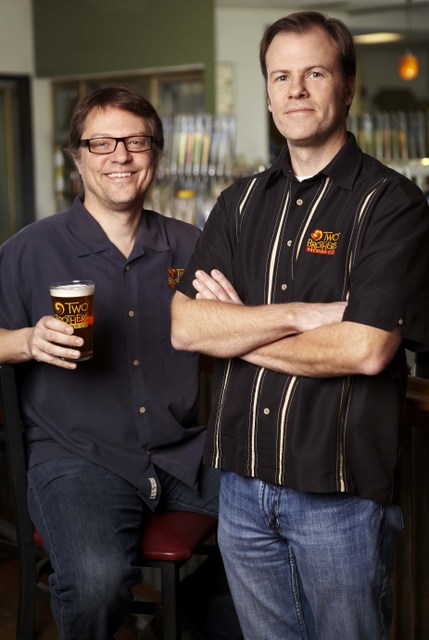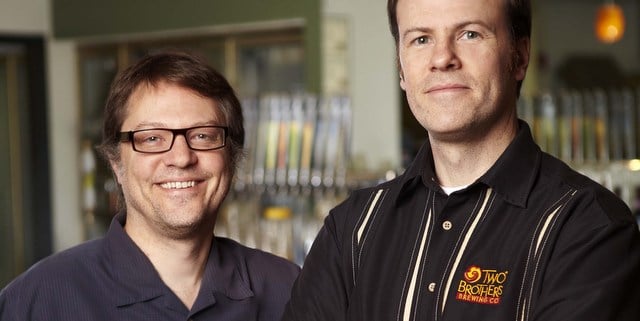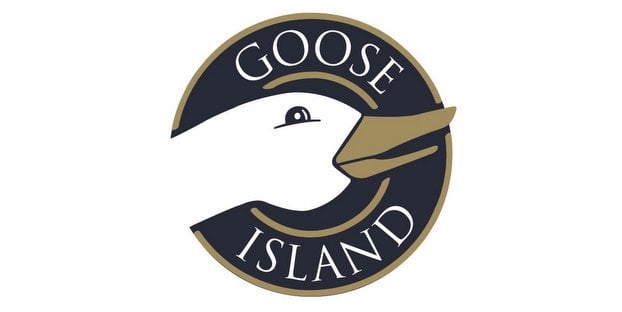CBB: That’s pretty awesome. Changing gears a little to the business side of brewing. Since you’re new into the distribution game, what advice would you give to a new craft brewer who’s learning how and where to sell his or her craft beer?
Jim: That’s a loaded question.
Jason: No kidding.
Jim: Obviously, quality is super important. Everybody says their quality is the best and that quality is the most important thing, but you know, a lot of breweries right now, just because it’s exploding out there, don’t have the proper tools to really ensure quality. They don’t have the labs. They don’t have technicians on staff to help them. This is maybe getting off topic a little bit, but it’s one of my major fears. In 1997 when we started, every brewery in Illinois except for Goose Island closed. There weren’t many. There were breweries like Chicago Brewing Co. and Golden Prairie. It wasn’t necessarily those beers, but the market in general had these people getting into it that just didn’t know what they were doing. It was a proliferation of beers that were not very good. That’s a concern I have right now in the industry. It’s quality. People go out and have bad experiences with craft beer, and they might generalize the segment as a whole. That’s something I think every craft brewery needs to be conscientious of.

CBB: Jason, what do you think? It doesn’t have to be about distribution, but is there any advice you can part with for up-and-coming craft brewers?
Jason: If you want to make a million dollars, start with two. And then on the flip side of that, don’t over-anticipate your growth pattern. Just because the industry is growing rapidly, you still have to have realistic goals set. We talk to a lot of people with unrealistic goals. They haven’t even opened their doors yet, and they’re going to blow the industry up like they’re Sierra Nevada or something. You can get there, if that’s your goal, but have realistic expectations from the start. Don’t overbuild your capacity, or you could easily run out of capital — unless you’re well-funded. And always remember that your wholesaler is your partner. He’s not the enemy. You’ve got to work together. I see too much of that, right? We wear both hats, so we’re big believers in the partnership of it, and I feel that’s been a big reason for our success over the last 18 years has been to have a partnership-style relationship with our wholesalers.
CBB: That’s what we love about it. It’s a relationship business. Have you guys been out on the trade show floor making any new relationships? Seen anything cool?
Jason: This year, we’re actually not shopping, which is strange. We just put in the can line, and we’re like, “Ok, there’s a moratorium on buying anything.” We’ve got 10 guys here, and they’re all like, “Whoa-HO-HO, it’s Christmas!” And we’re like, “Nope! No buying. It’s just window shopping this year.”
Jim: I feel there are a lot of technical things coming into our scale and size or brewery — things that exclusively used to be only for the big three. Those systems are being downsized appropriately, so they are affordable and easy to use for the medium-sized craft brewer like us. That’s pretty interesting to see the technologies available to us now.
Jason: That’s a very good point. Some of that stuff used to be hard for us to find. The big players are looking at this industry like they should. There are 11,000 people here for a reason. There are definitely some neat toys coming.
CBB: Is there anything locally — in Illinois — that you’re focused on legislatively? Are there any laws you’re looking to change in your state or federally?
Jim: Very much so. The Illinois Craft Brewers Guild has gotten pretty big and sophisticated. We’re about 80 members now, and there’s 95-ish breweries there in Illinois. We’ve got a very devoted board of directors, and we’ve also got a legislation committee now. We have a part-time lobbyist in Springfield, so we’ve been really working on some of the restrictions that have been put in place as far as cross-ownership in particular with brewpubs and manufacturers [read: brewers].
We’ve come to terms I think with every interested party on some legislation that I think will pass this spring that will allow manufacturers to own up to three brewpubs in the same state. There’s a three tier issue because a brewer’s a manufacturer, and a brewpub in Illinois is considered a specialty retailer, so you’re crossing that tier line, but there making an exception for us now, and everyone’s excited about it. There’s a lot more growth opportunities, especially from the micro-side where you want to get a tasting room or something in addition. We’ve worked hard on it, so we’re pretty happy that it looks like it’s going to go right through.
CBB: Congrats, man. What’s next for Two Brothers? Anything on the horizon you’d like to mention? I mean really, do you guys need any more work to do?
Jason: I think we have our hands full at the moment. Eight weeks into a restaurant in Arizona and six months in as a wholesaler. It’s keeping us busy. We have ideas, but no set plans yet.
CBB: Is all of this still fun for you guys? It sounds like a lot of work.
Jason: Yeah, we’re still having fun. If you can’t tell by the smile on my face, we’re definitely still having fun.
Be sure to read Part I of the Ebel Dialogs, which posted yesterday at 12:30 p.m.





Day two with the two brothers behind Two Brothers Brewing http://t.co/AAE6Ui6boS via @craftbrewingbiz
Michigan Breweries liked this on Facebook.
Grist Mills liked this on Facebook.
Ed Griffith liked this on Facebook.
Ken Meng liked this on Facebook.
Craft Beer Hat Club – CBHC liked this on Facebook.
Brew and Be Covered liked this on Facebook.